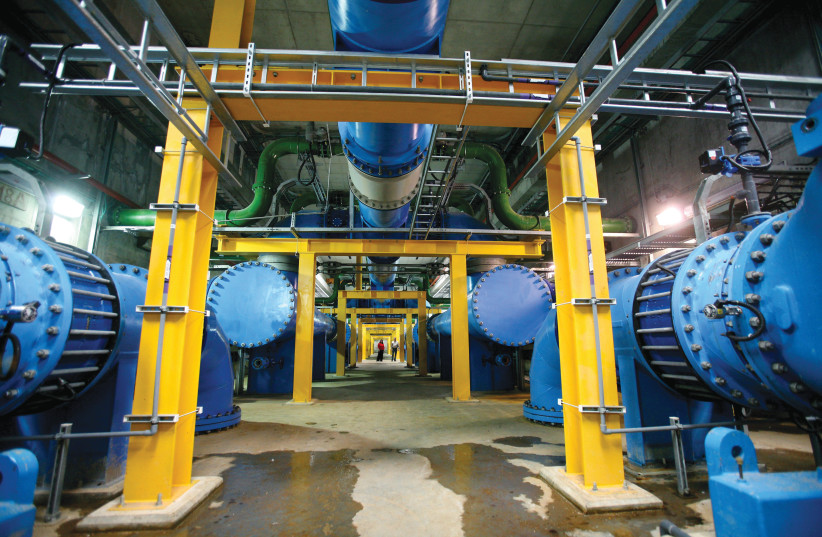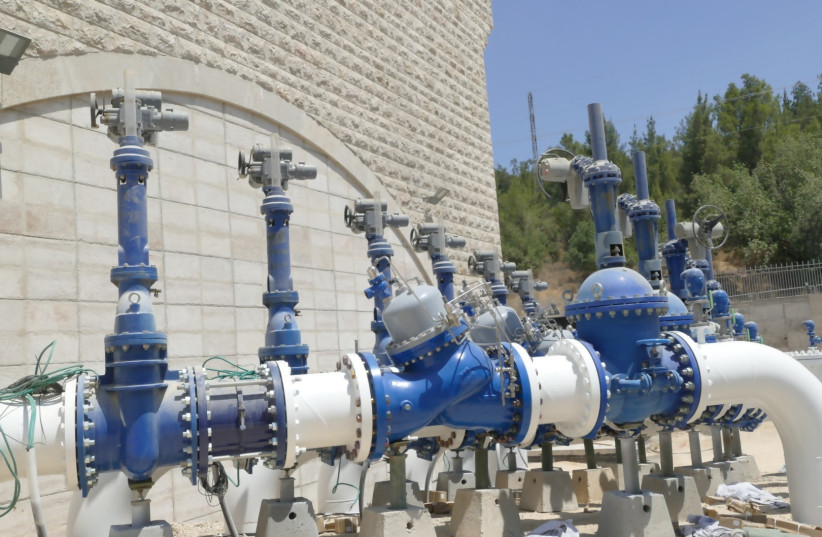The global climate crisis and the need for energy efficiency are causing countries and international water companies to look for breakthrough technologies – one of which is a system developed by Israeli start-up Evolution Water.
Employing artificial intelligence to manage infrastructure for drinking water, sewage and effluent, provides significant savings in energy both for the water company and the country.
The major advantage of Evolution Water is based on its successful cooperation with Mekorot, Israel’s national water company. Mekorot has invested in the Israeli start-up. It is important to emphasize that Mekorot is the largest civilian electricity consumer in the State of Israel at a cost of about NIS 1 billion per year. Any change for the better in its energy consumption directly affects the pockets of all Israeli citizens in the price of both electricity and water.
Mekorot is the single largest civilian energy consumer in Israel consuming 5% of the total amount of energy used in the country. It is urgent that it lower its energy consumption, both for reducing the carbon footprint and for possibly a future reduction in water tariffs.
To this end, Mekorot has selected Evolution Water to lead and carry out the energy efficiency of its systems. The Israeli start-up is encouraged by its successful experience with Mekorot, which has already shown positive results, and that will help it make an expected expansion to Asia, Europe and America.

“Taking the technology of artificial intelligence and introducing it to the world of infrastructure is a revolution. It’s like creating the smartphone,” emphasizes Evolution Water CEO Amir Yaar.
“The world of infrastructure has not changed for decades. There is a great deal of waste, energy problems and pollution,” says Yaar. “We wanted to take artificial intelligence and look for partners who are early technology adopters – large companies or government agencies that don’t mind testing new technologies and whose substantial ecosystem [are not affected by that].”
Yaar adds that one of the main reasons behind Evolution Water’s successful collaboration with Mekorot is its management. “A company’s success starts with people, and most government companies do not move quickly on innovation. It’s a different story with Mekorot – they have the right people to work with.”
Yaar recalls the beginning of his association with Mekorot about two years ago when the coronavirus pandemic broke out. “I met with Mekorot management and raised the possibility of taking their database and introducing digital technology to their massive infrastructure. They asked me what the benefits were. I replied that if I succeeded, I would probably lower their electric consumption by 15%, and as a result, the general consumption in Israel would drop by one or two percentage points.”
THE JOINT efforts of Evolution Water and Mekorot over the past year and a half – including running a pilot program in the most demanding areas in terms of consumption by the water company – illustrate the potential savings for the Israeli energy market and suggest possibilities for the world. “It’s a very extensive system,” explains Yaar. “Mekorot has different tariffs for daily water consumption. They need to manage supply and demand, maintenance, management of reservoirs and supply; it costs a great deal of money. Since December 2020, we have been working closely with Mekorot to implement the technology, and we have been able to predict and manage Mekorot’s systems using artificial intelligence. They have a great deal of data regarding consumption, demand, and security, and they are also in the process of laying fiber optics for pipes. We will manage the data and suggest recommendations to the water company’s control rooms, when and how to operate.
“Today we are active in nine control rooms,” Yaar continues. “Mekorot chose to begin with the most difficult area, Ayalon-Jerusalem, which is responsible for 40% of the corporation’s electricity consumption, and we are now working on system learning and expansion. The system learns the topology, receives data on weather, prices, pumps and the like. There are a million parameters, and it learns [them] and optimizes.
“Mekorot is essentially the largest distributor in Israel,” he adds, “and it does it using old systems. The state supports Mekorot and gives it bonuses if it reduces its annual electricity consumption by 1%. The world is going in the direction of energy efficiency. I am reducing the electricity consumption of Mekorot and of Israel as a country and creating energy efficiency. I am providing the brains for old systems and making them advanced. I can use the existing systems in a better way and plan the future more intelligently for future generations.”

There is no doubt that the field of energy has recently become the focus of global discussion, with much of the dialogue focusing on the issue of water – especially in the Middle East, though not exclusively. Experts fear that due to the climate crisis and global warming, there will not be enough water for the world’s population.
A greater emphasis is being placed on desalination and the use of other technologies. This trend connects to Evolution Water’s strategic concept of establishing ventures in various infrastructure areas, together with international strategic partners. The company is part of the parent group eVolution networks, the first Israeli start-up in which multibillionaire Warren Buffett invested in 2015.
YAAR, AN international entrepreneur who has led several companies and has been involved in innovation for years, is in the process of building the management of the company. He appointed Amos Malka as chairman of Evolution Water, as the company embarks on a $5 million funding round at a valuation of $90m. It is not just funding but primarily who will bring in the money. He says, “I’m in touch with the leading international water companies in every country because that’s our strategy. Those who invest with us will not necessarily look for immediate profit. These are people who want to be strategic partners in their target countries such as Singapore, Thailand, Saudi Arabia, the USA and the like. One of the main things coronavirus has done is convince water companies to take risks and seek value for themselves.”
Malka continues, “Because there is such great trust in Mekorot around the world and because we are making a real difference, I can persuade executives from water companies and international corporations to bring their staffs to Israel to test it for themselves. I believe that it is irresponsible to give up on an opportunity to lower the electricity consumption of your water company, and of course your country. Who would be against less pollution and [greater] energy efficiency? All of our activities fit perfectly with the vision presented by Prime Minister Naftali Bennett at the Glasgow Climate Conference, who spoke about the use of blue and white technologies to help the world solve the climate crisis.”
If you want to understand how revolutionary the integration of the Evolution Water system is, the company likes to compare what they do to the world of infrastructure to what smartphones have done to the communications industry. The company’s platform gives a “brain” to old infrastructures and makes them intelligent without the need for a huge financial investment in the replacement of existing structures, which is not always possible with the country’s aging infrastructure. The company wants to take the success of the experiment with Mekorot and do the same in the international market.
“The exciting work with Mekorot and its great support, which sees it as a flagship project, helps us work with water companies and international investment companies,” says Yaar. “The purpose of the current round of fundraising is to enable me to operate internationally and start engagements in three or four other countries, with the goal of being in production by the end of 2022. Our activities are critical for some of the countries.”
He cites Saudi Arabia as one example, where the cost of transporting water accounts for between 15% to 20% of the country’s electricity consumption. “They have no water, and everything is based on desalination facilities, but Riyadh, the capital, is located 450 km. from the desalination facilities, and its altitude is 600 m.,” he explains.
“It is the same in the United States and in mountainous areas that have high dispersal. We come in and are making a real change – first in energy efficiency in the water systems – but in the future, we will also deal with water quality. We end up analyzing the infrastructure, and the possibilities are endless. That’s part of why this project is so important to me. It’s exciting to see the enthusiasm there is in the world. Everyone needs it.
“It is not possible to replace a state’s infrastructure system,” he emphasizes, “it is not a simple thing. I make it possible to use existing information, manage things better and improve performance by tens of percent. In addition, we maintain the privacy of the facility because the water corporation system is separate from the state systems and have no direct access to them, so there is neither a security risk nor any risk of losing information.”
Translated by Alan Rosenbaum.
This article was written in cooperation with Mekorot.
